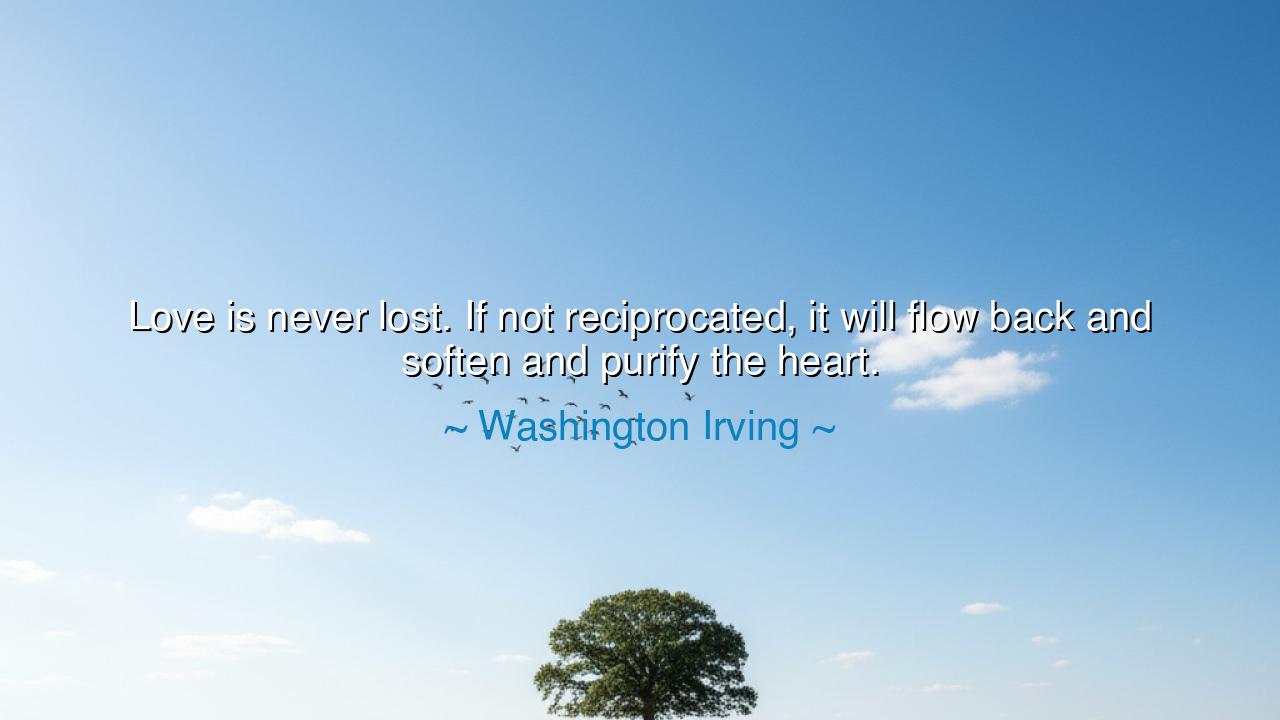
Love is never lost. If not reciprocated, it will flow back and
Love is never lost. If not reciprocated, it will flow back and soften and purify the heart.






“Love is never lost. If not reciprocated, it will flow back and soften and purify the heart.” — Thus wrote Washington Irving, the tender poet of memory and sentiment, whose words breathe with the quiet melancholy of truth. In this single line, he reveals one of the deepest mysteries of the human spirit: that love, once born, is never wasted. Even when it is not returned, even when it meets silence or rejection, it does not perish. It transforms. It turns inward, not as bitterness, but as grace — as something that softens pride, purifies sorrow, and deepens the soul. For love, once awakened, cannot die; it merely changes form.
Irving, the author of The Legend of Sleepy Hollow and Rip Van Winkle, was a man acquainted with both beauty and loss. In his youth, he loved a woman named Matilda Hoffman, whose untimely death at seventeen left him heartbroken. He never married thereafter. Yet from that unfulfilled love grew a gentleness and wisdom that would color all his writings. He did not allow his sorrow to harden him; instead, it refined him. Out of his grief, he learned what this quote declares — that unreturned love still serves a purpose, for it cleanses the heart of selfishness and teaches compassion for the pain of others.
To say that love is never lost is to understand that love itself is not dependent on its outcome. Its worth does not come from being received, but from being given. When we love — truly, without condition — we align ourselves with something eternal. Whether our love is embraced or rejected, it changes us. It expands our capacity to feel, to forgive, to endure. Even when we are hurt, the act of loving refines our spirit like fire refines gold. This is the secret hidden in Irving’s words: that love, when pure, is its own reward. It leaves the heart softer, cleaner, and nearer to the divine.
History gives us many examples of souls who lived this truth. Think of Vincent van Gogh, the painter whose life was filled with rejection and loneliness. He loved humanity through his art — pouring his tenderness and pain into colors that seemed to breathe. Few understood him while he lived; fewer still offered him affection. Yet his love did not vanish. It flowed back into his own heart, purifying his vision until he could see beauty in every star, every field, every tear. Though unloved by the world, he became a vessel of love for generations to come. His heart was broken, yet through that breaking, his spirit was illuminated.
This is what Irving means when he says love flows back. It is like a river that meets a wall but does not dry up; instead, it turns, finds a new course, and nourishes the land it passes through. When love cannot reach another, it returns inward — not as resentment, but as wisdom. It teaches patience where there was haste, gentleness where there was pride, and understanding where there was judgment. It reveals that the heart’s truest strength lies not in being loved, but in remaining loving.
Yet, this teaching is not meant to romanticize pain, but to redeem it. Love unreturned can wound deeply; it can shatter illusions and strip the soul bare. But in that stripping, something sacred is revealed. The ego — which demands reward — is silenced, and the spirit learns humility. In the stillness that follows heartbreak, the soul often meets itself for the first time. It discovers that to love without need, to love without expectation, is to touch something eternal — something that no rejection can diminish.
Therefore, dear listener, remember this wisdom: to love is never a mistake. Do not regret the affection you gave, even if it was unreturned, for every act of love enriches your soul. Let no bitterness poison the well of your heart. Instead, allow your unreciprocated love to soften you, not harden you — to make you more tender, not more guarded. Continue to give love freely, for it will return to you in another form: as peace, as patience, as quiet strength.
For this is the eternal rhythm of life, as Irving so gently teaches — that love is the alchemy of the soul. It transforms pain into compassion, loss into wisdom, longing into prayer. Even when unseen or unshared, love remains a sacred fire within you, purifying and ennobling your being. And when all else fades — when fortune, beauty, and youth have passed — it is love, still flowing and still alive, that will reveal the heart’s truest and most radiant light.






AAdministratorAdministrator
Welcome, honored guests. Please leave a comment, we will respond soon